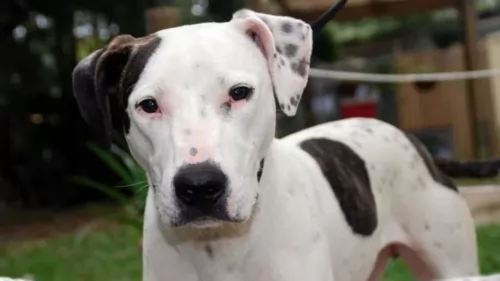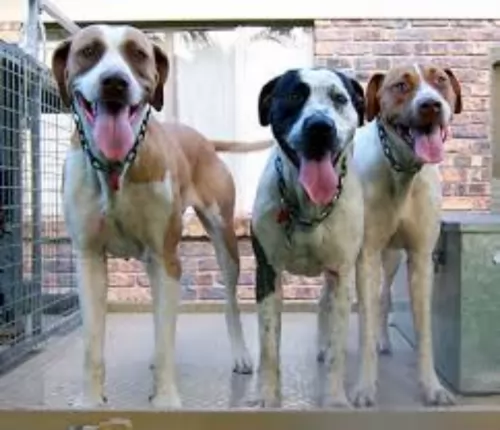 Petzlover
Petzlover Bull Terrier is originated from United Kingdom but Bull Arab is originated from Australia. Bull Terrier may grow 8 cm / 3 inches shorter than Bull Arab. Bull Terrier may weigh 21 kg / 46 pounds lesser than Bull Arab. Both Bull Terrier and Bull Arab has almost same life span. Both Bull Terrier and Bull Arab has almost same litter size. Both Bull Terrier and Bull Arab requires Low Maintenance.
Bull Terrier is originated from United Kingdom but Bull Arab is originated from Australia. Bull Terrier may grow 8 cm / 3 inches shorter than Bull Arab. Bull Terrier may weigh 21 kg / 46 pounds lesser than Bull Arab. Both Bull Terrier and Bull Arab has almost same life span. Both Bull Terrier and Bull Arab has almost same litter size. Both Bull Terrier and Bull Arab requires Low Maintenance.
 The Bull Terrier belongs to the Terrier group of dogs and this already tell you that he is highly energetic and that he is essentially intolerant of other pets.
The Bull Terrier belongs to the Terrier group of dogs and this already tell you that he is highly energetic and that he is essentially intolerant of other pets.
They are hunters by nature. The Bull Terrier is known as the Gladiator of the canine world. This breed came about through English breeders of the late 19th century, crossing old fighting dogs which carried Bulldog blood with Terriers. It was in the 1850s that James Hinks of Birmingham in the West Midlands was the first person to standardise breed type for the Bull Terrier. Hinks wanted his dogs to be white, and breeding was designed to achieve this.
Because of medical problems with the all-white dogs, Ted Lyon introduced color, using the Staffordshire Bull Terrier, and these became a separate variety. It is however, the white strain that is famous for pets as well as for show purposes.
 In the 1970’s feral pig hunters wanted a dog that could be aggressive in finding and capturing the pigs. The hunters crossed the German Shorthaired Pointer, the Bull Terrier and the Greyhound to develop the Bull Arab. It is believed that the hybrid is at least 50% Bull Terrier. It is also possible that there is some Doberman, Mastiff, Great Dane and/or Pointer in the hybrid as well.
In the 1970’s feral pig hunters wanted a dog that could be aggressive in finding and capturing the pigs. The hunters crossed the German Shorthaired Pointer, the Bull Terrier and the Greyhound to develop the Bull Arab. It is believed that the hybrid is at least 50% Bull Terrier. It is also possible that there is some Doberman, Mastiff, Great Dane and/or Pointer in the hybrid as well.
The job of the Bull Arab is to hunt out the feral pigs, grab one by the ear and hold it until the hunter arrives. They have a strong sense of smell and that is how they find the pigs.
Mike Hodgens, an Australian, developed the hybrid and added some Bloodhound as well to get that ability to smell out the pigs at great distances. They are also capable of catching buffalo and cattle. Some Australians use the breed in cattle or buffalo ranching. They are registered with the DRA or Dog Registry of America, Inc.
 The Bull Terrier is a strongly built, muscular dog with a distinctive egg-shaped head. The height of this dog is roughly 53 – 61cm and he weighs in at about 24 – 29kg. He has a short, dense coat which comes in different colors such as white, red, fawn and white or brindle.
The Bull Terrier is a strongly built, muscular dog with a distinctive egg-shaped head. The height of this dog is roughly 53 – 61cm and he weighs in at about 24 – 29kg. He has a short, dense coat which comes in different colors such as white, red, fawn and white or brindle.
The ears are medium sized and erect and the eyes are pig-like, small and dark. The medium length tail is carried slightly upwards.
The Bull Terrier is a determined, strong-willed, stubborn dog and he will require firm handling and training. With socialization and training, he becomes a friendly, loving dog who is good around children.
He tends to be possessive with his human family and their territory, making him aggressive with other pets. Bull Terriers actually have even temperaments and they are good, social dogs with people. He is courageous, brave, full of spirit and character.
 Mike Hodgens succeeded in developing a powerful, well built dog. The Bull Arab has a powerful head and muzzle. He has moderate length drop ears and bright eyes that match the color of his coat. His chest is neither shallow nor deep and his back is straight and strong. Their tails are tapered and pointed yet the base is thick. They are a double-coated dog. They can be white with black, tan or liver, flecked or bicolor.
Mike Hodgens succeeded in developing a powerful, well built dog. The Bull Arab has a powerful head and muzzle. He has moderate length drop ears and bright eyes that match the color of his coat. His chest is neither shallow nor deep and his back is straight and strong. Their tails are tapered and pointed yet the base is thick. They are a double-coated dog. They can be white with black, tan or liver, flecked or bicolor.
 The way people bring their dogs up has a lot to do with the way they turn out. The Bull Terrier has often been thought to be a dangerous dog, but this is because of a bad upbringing.
The way people bring their dogs up has a lot to do with the way they turn out. The Bull Terrier has often been thought to be a dangerous dog, but this is because of a bad upbringing.
A dog like the Bull Terrier who has received firm, fair and loving training is an absolute pleasure to have as a pet. Yes, he is a strong willed, stubborn and intelligent dog and he has the make-up to turn out to be a handful. It is perhaps why he isn't the best choice for first-time dog owners who aren’t familiar with the breed and who don’t raise him the right way.
If you choose a Bull Terrier, bring him up correctly, have him trained and socialized and never neglect him and he is guaranteed to become a wonderful, loving family member.
 The Bull Arab is intelligent, calm and loyal. Like Pit Bulls in the U.S., the Bull Arab has a reputation for aggression against both people and animals. There is no data to support these claims. They have been used as therapy dogs and companion animals very successfully. They are great with kids and very affectionate. The breed is cited as being used for companion and therapy animals
The Bull Arab is intelligent, calm and loyal. Like Pit Bulls in the U.S., the Bull Arab has a reputation for aggression against both people and animals. There is no data to support these claims. They have been used as therapy dogs and companion animals very successfully. They are great with kids and very affectionate. The breed is cited as being used for companion and therapy animals
 Your Bull Terrier is a robust breed, but there are some health issues that you will want to be aware of. For instance, the white Bull Terrier is more prone to deafness than the Brindle or tri-colored Bull Terriers. With good food and lots of love and care, he can reach 14 years of age. However there are one or two ailments what you want to be aware of.
Your Bull Terrier is a robust breed, but there are some health issues that you will want to be aware of. For instance, the white Bull Terrier is more prone to deafness than the Brindle or tri-colored Bull Terriers. With good food and lots of love and care, he can reach 14 years of age. However there are one or two ailments what you want to be aware of.
This is a common orthopedic condition with dogs, affecting both knees and resulting in loss of function and discomfort. Patellar luxation can sometimes come from a traumatic injury to the knee. However, with non-traumatic patellar luxation, the femoral groove for the knee cap is shallow or absent.
Not every variety of skin cancer in dogs is caused by sun exposure, but sun damage to the skin of the pure white Bull Terrier can be a factor. Dogs with white coats are more susceptible to sun damage. Speak to your vet about symptoms so that a physical examination will reveal the reason for sores on the skin.
 The Bull Terrier is a stocky, robust breed and he will need plenty of exercise. He thrives on a good run, long walks and ball games. He is notoriously destructive, so you need to recognize this before you buy such a dog, because simply putting one in your back-yard and ignoring him will make him aggressive and destructive. This is a dog that needs lots of physical as well as mental exercise.
The Bull Terrier is a stocky, robust breed and he will need plenty of exercise. He thrives on a good run, long walks and ball games. He is notoriously destructive, so you need to recognize this before you buy such a dog, because simply putting one in your back-yard and ignoring him will make him aggressive and destructive. This is a dog that needs lots of physical as well as mental exercise.
With the short coat, Bull Terriers are easy to groom, and a brushing twice a week will keep the coat in tip top condition. He will also love the time you spend with him. Shedding of hair with the Bull Terrier is more frequent in the Spring and Fall.
Nail clipping and brushing of teeth are two other grooming routines for your dog. Remember that with teeth brushing, don’t be tempted to use human toothpaste as this can be toxic for your pet. Speak to your vet if in any doubt about how to brush your pet’s teeth.
 This is a working dog so he needs to eat the right kind of quality dog food. In order to avoid bloat do not feed large meals but rather feed one to two cups of food two to three times a day.
This is a working dog so he needs to eat the right kind of quality dog food. In order to avoid bloat do not feed large meals but rather feed one to two cups of food two to three times a day.
Hunting Accidents – this is the biggest reasons for health problems with the Bull Arab.
These are working dogs that are inactive when not working. They need a lot of exercise if they are not used for hunting. Agility, Tracking and hunting games, and field trials.